|
|
|
Sort Order |
|
|
|
Items / Page
|
|
|
|
|
|
|
| Srl | Item |
| 1 |
ID:
167238
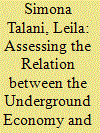

|
|
|
|
|
| Summary/Abstract |
A number of studies show the importance of the underground economy in defining the dynamics of migratory flows to southern European countries. A very high number of foreign-born workers are employed in the underground economy in Italy. However, by no means has the informal economy in the country been created by migrants. Instead, the opposite is true. Research demonstrates that it is precisely because the underground economy provides a wealth of employment opportunities that there is a strong incentive for migrants to access southern European countries, especially Italy, despite the difficulties in gaining regular migration status.
|
|
|
|
|
|
|
|
|
|
|
|
|
|
|
|
| 2 |
ID:
162876
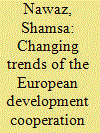

|
|
|
| 3 |
ID:
182575
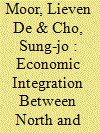

|
|
|
|
|
| Summary/Abstract |
As the possibility of North Korean regime collapse has been raised and the economic gap between North and South Korea has been increasing, temporary separate operation has emerged as a way of economic integration of North and South Korea. Its main idea is that even if political integration is achieved rapidly, economic integration should proceed over time. It is generally accepted that temporary separate operation has desirable economic consequences but doubts about the feasibility are often raised because it is a scenario based on many assumptions, and politicians might prefer radical integration based on their short-term political interests. So, this paper aims to develop a temporary separate operation by providing more concrete reasons, by anticipating problems and by suggesting policy measures to enhance the feasibility. For this, the paper examines German reunification and European integration (especially Eurozone crisis) cases and compares them with the situations and features of economic and financial sectors of North and South Korea.
|
|
|
|
|
|
|
|
|
|
|
|
|
|
|
|
| 4 |
ID:
135075
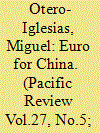

|
|
|
|
|
| Summary/Abstract |
The aim of this paper is to analyze China's strategy in relation to the euro. The first section summarizes China's active support to the single currency since its creation up to the first phase of the current Eurozone debt crisis. It shows how China has used a two-pronged approach. It has developed a public campaign in favor of the euro, especially when the market sentiment has been bearish on the single currency, and it has continued to be an active player in the European sovereign debt markets. The second part explains why China has been so supportive. Beijing wants to move away from dollar hegemony and thus it favors a tripolar monetary system based on the US dollar, the euro and the Chinese renminbi (RMB). With this aim, and despite the crisis, China has continued to diversify its foreign reserves into the euro making it by now ‘too important to fail’, not only because China holds roughly $1 trillion in euro-denominated assets, but also because for China the Eurozone is a crucial market and an important strategic counterweight to US dominance in world affairs. Finally, the third part focuses on how by the end of 2011 China switches to a more cautious approach due to the difficulty involved in rescuing the Eurozone. Domestic pressures, public outcry in Europe against being saved by China, the unwillingness of the European leaders to enter into strategic bargaining and Germany's strategy to use sovereign bond spreads as a market mechanism to create ‘more Europe’ have convinced policy-makers in Beijing to keep a lower profile while making sure the value of the euro remains stable.
|
|
|
|
|
|
|
|
|
|
|
|
|
|
|
|
| 5 |
ID:
122806
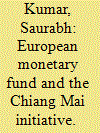

|
|
|
| 6 |
ID:
126449
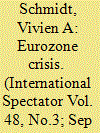

|
|
|
|
|
| Publication |
2013.
|
| Summary/Abstract |
The economic policies of the eurozone crisis, generally presented in apolitical terms, are political both in their underlying principles and in their effects. The EU's 'policy without politics', based on ordo-liberal ideas for macroeconomic austerity and neo-liberal ideas for structural reform, has left the member states with 'politics without policy', in which dissatisfied citizens have had little recourse. This has led to increasing political disaffection, polarisation, and Euroscepticism. Proposals to politicise so as to legitimise the EU by electing the Commission President hold some promise, in contrast to election of the Council President. But the danger, given the eurozone crisis, is that such elections will only politicise so as to delegitimise.
|
|
|
|
|
|
|
|
|
|
|
|
|
|
|
|
| 7 |
ID:
113857
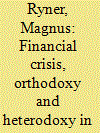

|
|
|
|
|
| Publication |
2012.
|
| Summary/Abstract |
Although the financial/Eurozone crisis has profound effects on the EU, European integration scholarship failed to even recognise that there might be a problem. This article argues that this is due to the highly orthodox nature of European integration scholarship and the blind-spots that inhere in its instrumentalist basic code. It makes the case for a heterodox recasting of the production of knowledge about the EU, and argues that post-Keynesian, post-Marxist and neo-Weberian political economy can make significant contributions in that regard.
|
|
|
|
|
|
|
|
|
|
|
|
|
|
|
|
| 8 |
ID:
164353
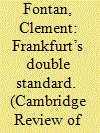

|
|
|
|
|
| Summary/Abstract |
In this article, I examine the bias in favour of financial markets displayed by the European Central Bank (ECB) during the Eurozone crisis. Having analysed the roots of the ECB’s bias, I explore the discrepancy between the conditionality of ECB financial support that is directed towards states and that which is directed towards markets. On the one hand, the ECB has exerted strong coercive and cognitive pressures to reform Eurozone economic governance in a market-friendly way. On the other hand, it has employed monetary measures to save large Eurozone banks from a complete meltdown without controlling how these banks use their provided liquidities. I conclude by stressing the democratic problems engendered by the ECB’s bias.
|
|
|
|
|
|
|
|
|
|
|
|
|
|
|
|
| 9 |
ID:
153932
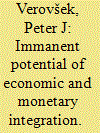

|
|
|
|
|
| Summary/Abstract |
The Eurozone crisis revealed fundamental flaws in the institutional architecture of the Economic and Monetary Union. Its lack of political steering capacity has demonstrated the need for a broad but seemingly unachievable political union with shared economic governance and a common treasury. Agreement on further measures has been difficult to achieve, as different actors have imposed divergent external criteria for the success of the Eurozone. As part of their heritage in Western Marxism, the critical theorists of the Frankfurt School sought to overcome such problems by identifying internal standards for social criticism. Building on their understanding of immanent critique, I argue that the Eurozone already contains the normative principles necessary to support greater political integration. While the citizens of Europe must provide the democratic legitimation necessary to realize this latent potential, the flaws revealed by the crisis are already pushing Europe towards greater transnational solidarity.
|
|
|
|
|
|
|
|
|
|
|
|
|
|
|
|
| 10 |
ID:
121865
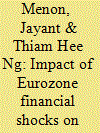

|
|
|
|
|
| Publication |
2013.
|
| Summary/Abstract |
Five years after the global financial crisis, the economies of the United States and the eurozone continue to struggle. How will Southeast Asian economies be affected should there be a further deterioration in conditions in the eurozone? In this paper, we present estimates using a Global Vector Autoregression (GVAR) model of the direct impacts of a further shock to the eurozone. We find that although the direct impacts are likely to be muted, it could trigger a much larger adjustment should it lead to a reassessment of risks and asset valuations. This is a real possibility given that vulnerability in the region has increased following massive inflows of capital and build-up of debt, related to successive bouts of quantitative easing in the United States initially, and now Japan. Should this happen, and with the IMF's resources already stretched, there is a pressing need to improve regional financial safety nets, which are currently unworkable, to deal with the fallout.
|
|
|
|
|
|
|
|
|
|
|
|
|
|
|
|
| 11 |
ID:
122807
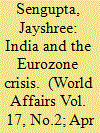

|
|
|
| 12 |
ID:
121582
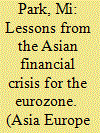

|
|
|
|
|
| Publication |
2013.
|
| Summary/Abstract |
This paper comparatively examines diverse responses from three major actors in the global political economy (the state, civil society, international financial institutions) to the Asian financial crisis of 1997 and the current eurozone crisis. First, it analyses conditional lending policies of international financial institutions (IFIs) such as the International Monetary Fund toward countries in fiscal distress. It then critically examines how the lending policies engendered social tensions and conflicts as austerity measures such as cuts to social welfare programmes hit hard on the populace. Examining how the state and civil society in Asia reacted to and, as a result of contentious state-civil society interactions, altered the policies of IFIs, the paper draws lessons from the Asian financial crisis for the European Union and puts forwards alternative policy suggestions.
|
|
|
|
|
|
|
|
|
|
|
|
|
|
|
|
| 13 |
ID:
126221
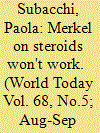

|
|
|
|
|
| Publication |
2012.
|
| Summary/Abstract |
Paola subacchi considers Europe's way out of its current crisis
|
|
|
|
|
|
|
|
|
|
|
|
|
|
|
|
| 14 |
ID:
128794
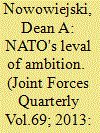

|
|
|
| 15 |
ID:
174768
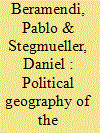

|
|
|
|
|
| Summary/Abstract |
The European Union provided a mixed response to the 2008 financial crisis. On the one hand, it refused to pursue fiscal integration through a common budget; on the other, it introduced significant transfers between countries that were designed to produce financial stabilization. The authors analyze this response as the outcome of democratic constraints on EU leaders. Given the EU’s current institutional structure, citizens’ preferences pose a binding constraint on what leaders can do as these preferences limit the scope of risk-pooling among members and the degree of political tolerance for different courses of action. The authors show that citizens’ preferences reflect differences in the geography of income, production regimes, and institutional organization. The heterogeneity of constituencies’ redistribution preferences combined with a diverse economic geography helps to explain why political constraints on national governments prevent them from engaging in further fiscal integration. By contrast, externalities among member states shift the preferences of citizens who may experience negative effects and make international redistribution politically feasible. The authors analyze these two mechanisms and present novel empirical results on the determinants of preferences for fiscal integration and international redistribution in the aftermath of the eurocrisis.
|
|
|
|
|
|
|
|
|
|
|
|
|
|
|
|
| 16 |
ID:
171098
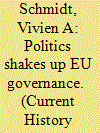

|
|
|
|
|
| Summary/Abstract |
EU governance, which was long apolitical and technocratic, with disagreements handled in private and deals made behind closed doors, has become more politically charged.
|
|
|
|
|
|
|
|
|
|
|
|
|
|
|
|
| 17 |
ID:
111029
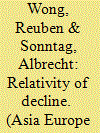

|
|
|
|
|
| Publication |
2012.
|
| Summary/Abstract |
This article is an attempt, in the context of the Eurozone crisis that has shaken Europe since 2008, to explore and deconstruct two pieces of conventional wisdom on French leadership in Europe and the world. The stereotypical image of a country in decline and denial, out of touch with today's globalised world, is reproduced so often in the Anglo-American media and even in scholarly discourse, that is has become a self-evident truism. The article examines this truism in two different perspectives: there is, on the one hand, the axiom that France has lost influence in Europe and that the balance of power has shifted inexorably to Germany and, on the other hand, the axiom that Europe does not matter in the global 'power shift' and that, as part of Europe, France does not count any more either. In questioning the origins and validity of these axioms, the authors argue that a strong perception bias persists and is constantly perpetuated even though reality has changed. Not only has France rather successfully adapted to globalisation in both political and economic terms, but it has also found new ways and discourses about its role as Germany's partner in leadership in the European Union. The paper goes on to show that both France and the EU retain and use significant levers for action in three dimensions of power-coercion, agenda-setting and attraction. It concludes that going into 2012, France remains an active and important actor, both in the EU and on the global scene. It is present and influential in major international institutions, effectively builds international coalitions and floats important ideas on reforming laissez-faire capitalism.
|
|
|
|
|
|
|
|
|
|
|
|
|
|
|
|
| 18 |
ID:
138416
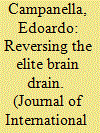

|
|
|
|
|
| Summary/Abstract |
Since the end of the World War II, Europe has been repeatedly afflicted by waves of brain drain, with varying degrees of intensity across time and countries. But these outflows of human capital have rarely turned into some form of brain circulation, nor have they been compensated by adequate inflows of foreign talents. Now, the Digital Revolution and the economic restructuring imposed by a never-ending Eurozone crisis are amplifying the costs of these human capital losses, creating skills shortages that are undermining Europe’s ability to compete globally. So far, the European Commission (EC) has taken steps to loosen immigration policies to attract skilled foreigners from across the world. A thorough historical analysis, however, will show that it is high time for European governments to reattract their runaways. Policies aiming at remigration, rather than immigration, will generate greater political and economic efficiency.
|
|
|
|
|
|
|
|
|
|
|
|
|
|
|
|
|
|
|
|
|